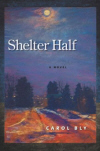Shelter Half
In this collection of overlapping stories, Carol Bly explores a town of moral highs and lows, a town held together by a family bakery, the ecumenical choir, and a need for automotive transportation. Bly has created a snow-covered community surrounded by the dark northern forest and the mysterious bears that inhabit it and a story about the chemicals that can either scrub the town clean or sully its very name.
In this collection of overlapping stories, Carol Bly explores a town of moral highs and lows, a town held together by a family bakery, the ecumenical choir, and a need for automotive transportation. Bly has created a snow-covered community surrounded by the dark northern forest and the mysterious bears that inhabit it and a story about the chemicals that can either scrub the town clean or sully its very name.
Each chapter gives us a new point of view – Dieter, the gentlemanly German; Bernie the seasoned cop; Stan Garris the auto dealer; Peter Tenebray the richest, most revered man in town. But despite the genre-sound of these characters, Bly’s story rises above the conventions we’ve come to expect from a mystery. She paints a vivid picture of a small town that is both familiar and strange:
Darrel lied in a natural flow. The man’s brain-dead waste ran out of his mouth like bad water from a culvert. It was the naturalness of Darrel’s lying that irritated Bernie. It was no good speaking to him about it because Darrel would only be confused. To Darrel, words were something you used to relieve yourself of the moment’s tension. Words did not symbolize a past action. Words did not constitute a promissory note for any future action. Darrel made promises because he knew he would feel better after he had spoken. It just barely mattered which words he chose to speak. Worse, he was a mama’s boy.
Bly’s characters are calm and they are kind. Never forget your manners, they say. Be polite. Don’t ask too many questions. But mannered small talk and actual perception are two different things. This story is about the truth below the daily conventions, the real stories that small town pleasantries dare not touch. It’s about the dangers of not thinking for yourself, of believing in a cause simply because you were drafted or christened into it. This is about the danger of things unseen – the fact that most go through life blissfully unaware:
Even really simple people like Menzies, the school principal, were bored with church. Menzies, that poor sap, had to show up there because the Board of Education members and a lot of other people knew that he slapped bad kids around some but if he showed up in church, it confused people’s judgments.
In a town populated by veterans, friends of veterans, and dedicated VFW members, there exists a leftover WWII animosity. The residents are still angry at the Germans and yet fail to see the real wrongdoings in their own town. Bly has created a world full of contradiction and hypocrisy. It’s a town where people dump bodies, steal dogs, and step in metal bear traps. It’s a world in which people are either saints or sinners, witty intellectuals or uninspired idiots, those who have faith or those who don’t. Brad Stropp, for example – a sinner, an uninspired idiot, a man without faith:
Whoever said the meek shall inherit the earth didn’t know anything about being on the bottom of the system in your own hometown. And another thing Brad Stropp was sure of: those ancient people like Jesus got to live outdoors all the time, keeping sheep from falling into hot sandy ravines, and kicking back with strangers at wells and saying wise things which people actually stayed to hear – nothing was like that now, and people weren’t like that now.
Bly forces us to look at the problem of kindness: Does unconditional kindness to friends and neighbors free you from involvement when that same kindness is being used for an evil just outside town limits? Does ignorance free us from guilt? Not according to Bly.
While Bly’s prose suffers from too many imagined scenarios and characters talking or thinking to themselves, it does redeem itself with an inspired woven plot that moves from the destruction of one life to the destruction of the environment we all share. If you stick with her until the end, you’ll find that this book is about more than just a small town and an unsolved murder, rising above convention to expose a dark moral and a deadly chemical undercurrent.





